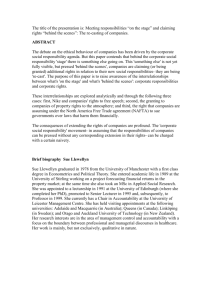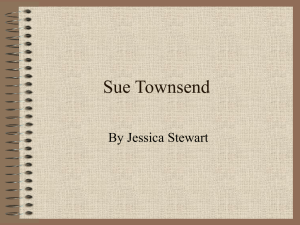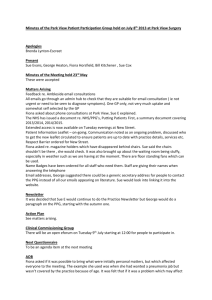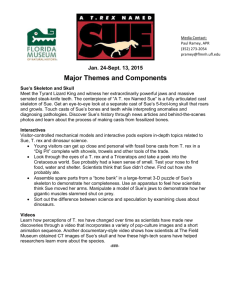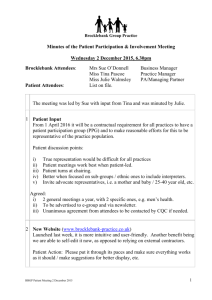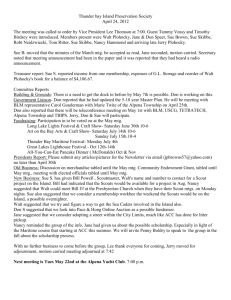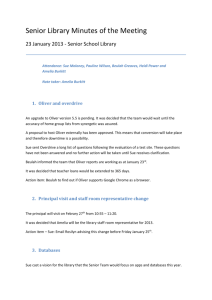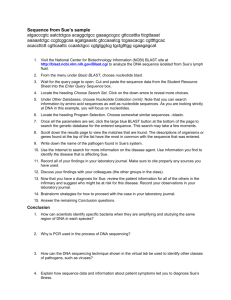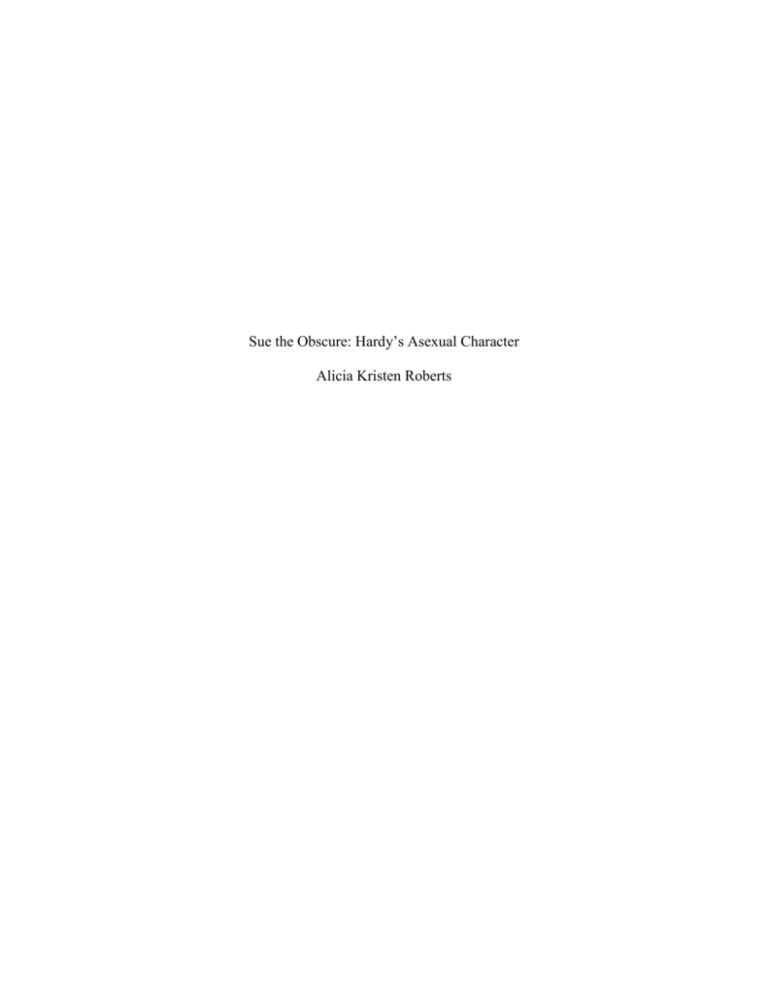
Sue the Obscure: Hardy’s Asexual Character
Alicia Kristen Roberts
Sue the Obscure 2
Eng 460: Hardy & Lawrence
Dr. Barbara Schapiro
5. 4. 2009
Sue the Obscure: Hardy’s Asexual Character
Sue Bridehead, in Thomas Hardy’s Jude the Obscure, puzzles critics across the board.
She’s part pre-Feminist, part conformist, part transcendent, part vain. Of all her qualities,
however, her sexuality confounds critics the most. Compared to Arabella, she seems part of a
whore/virgin dichotomy, like Richardson’s title character in Pamela, but she does not initially
aspire to virtue as Pamela does. In addition, Hardy seems to favor her above Arabella, even
though he shows his appreciation of healthy sexual urges through other aspects of the novel.
Most of the conflict around Sue’s sexuality appears in her relationships with Jude and Phillotson,
through which we see her resisting sex for a number of reasons. Sexual aversion cannot account
for all of these conflicts and the descriptions Hardy assigns to them. Rather, Sue demonstrates all
signs of being an asexual before the dominant ideology became aware of or understood
asexuality. Asexuals, as opposed to sexuals, do not experience sexual attraction or desire for sex.
This of course puts her in conflict with the dominant ideology of sexuals like Jude, so that she
becomes overwhelmed by the pressure and engages in sex against her will. Remarkably, few
critics have seen the novel from this perspective, in which Sue’s asexuality separates her from
the masses more than Jude’s interest in learning does for him, and the oppression she faces
causes an unfortunate tragedy as she lets herself be taken by the forces of the dominant ideology.
Hardy receives much attention for his exploration of sexual desire. Jude demonstrates this
quality of his work, especially in the characters of Arabella and Jude. Arabella, with her overt
sexual desire, serves as a foil to Sue. From the moment she throws the pig’s pizzle, she makes
Sue the Obscure 3
sexual gratification a clear component of her goals. She even tells her desire to her friends: “I
want him to more than care for me; I want him to have me—to marry me! I must have him. […]
I shall go mad if I can’t give myself to him altogether!” (49). Arabella deliberately contrasts
bodiless affection with sexual desire, and shows a preference even for the latter. Sue emphasizes
the foil nature of Arabella’s character when she claims that women could happily go without sex,
unlike men, and a woman “never instigates, only responds. We ought to have lived in mental
communion and no more” (356). In this instance, Sue can be open about her sexual preferences
by attributing them to womanhood, even though Arabella disproves her generalization. While
many in Hardy’s time surely had this stereotype, Arabella demonstrates Hardy’s belief that a
strong sexual desire can be found in women as just in men.
Hardy provides a general description of sexual desire in part IV of “At Christminster”
which provides the norm by which readers interpret Sue’s behavior. After concluding that “his
interest in her had shown itself to be unmistakably of a sexual kind,” Jude goes through a number
of sexual stages before their relationship even begins (97). First, he tries to avoid thinking about
her, but only thinks more of her. Second, he begins making excuses for contacting her, such as
suggesting that knowing her character could decrease his desire. In this instance, “A voice
whispered that, though he desired to know her, he did not desire to be cured [of this unexpected
and unauthorized passion]” (97). These excuses are driven by his sexual drive. Third, he
struggles with his desire as it begins to overcome his reasons for restraint. Fourth, he justifies his
desire, though only on a surface level, “For whatever Sue’s virtues, talents, or ecclesiastical
situation, it was certain that those items were not at all the cause of his affection for her” (98).
This description shows how important of a role bodily attraction plays in Jude’s desire for Sue. It
forms an essential part of the context within which Hardy details Sue’s asexuality.
Sue the Obscure 4
Sue differs greatly in the way she experiences attraction and in her relationship goals and
fantasies. Jude’s sexual nature, though presented primarily as normal and healthy, causes
immense conflict in his relationship with Sue. At one point, Jude confesses that he “shall always
care” for Sue, to which Sue replies, “And I for you. Because you are single-hearted, and
forgiving to your faulty and tiresome little Sue!” (152). In isolation, these statements seem
entirely appropriate to a couple sharing a strong sense of love. Jude’s reaction, however,
indicates the unspoken conflict: “He looked away, for that epicene tenderness of hers was too
harrowing. Was it that which had broken the heart of the poor leader-writer[? …] If he could
only get over the sense of her sex, as she seemed to be able to do so easily of his, what a comrade
she would make” (152). Jude’s acknowledgement demonstrates both that there exists a conflict
in sexual desire and that the conflict does not stem from a problem in Sue, but a difference
between the two of them. Just as he begins to wonder if her “epicene tenderness” caused the
death of her last romantic interest, he values Sue’s lack of sexual desire as a desirable trait.
Sue recognizes that most of the time her sexuality is in conflict with the dominant sexual
orientation. She expresses this awareness when she calls herself an outcast, or “Ishmaelite”
(138). The context of the conversation has more to do with societal conventions than sexuality,
but it is worth considering whether Sue may have had a second meaning which Jude, calling her
an “urban miss” in line with the initial conversation, did not pick up on. In this conversation, Sue
says, “I crave to get back to the life of infancy and its freedom […] You don’t know what’s
inside me” (138). Infancy is a time in which a person is not expected to feel sexual attraction,
except perhaps at the level of the unconscious. Sue could thus be referring to the freedom she felt
from social expectations of sexuality. Most likely, her statement encompasses all of the ways in
which Sue proves to be different from the norm.
Sue the Obscure 5
Readers don’t have to rely on subtle implications to learn of Sue’s asexuality—the novel
states it outright. In reference to her role as Phillotson’s wife, the narration calls her, “quite
unfitted by temperament and instinct to fulfill the conditions of the matrimonial relation with
Phillotson, possibly with scarce any man” (219). First, we must dismiss the possibility of Sue’s
sexuality being anything other than heterosexual or asexual, since the novel does not provide any
evidence of other sexual interests. Second, we must consider the partner within the matrimonial
relationship. The novel prepares the audience to sympathize with Sue’s disgust of sex with
Phillotson, but what about the qualifier of “scarce”? Some readers may take this to mean that Sue
has a common sense of sexual desire, but she can only express it with someone she loves like
Jude. Her disinterest and dislike of sex appears equally in that relationship, however, as I will
later show. The qualifier thus might refer to the fact that some asexuals are able to fulfill the
sexual needs of sexual partners if they have the right partner.
Asexuality has only recently gained recognition as a label for a mode of sexuality. In
medical journals, it is generally classified alongside heterosexuality, bisexuality, and
homosexuality, although an asexual could be any one of those. The percentage of asexuals in a
population is determined by asking people if they agree with the statement, “I have never felt
sexually attracted to anyone at all.” The problem with this statement is that it implies an
understanding of a phenomenon not personally experienced. Both the asexual label and that
statement exclude gray areas, but the label is useful to provide acceptance. A low sex drive is
looked down on, but no sex drive is considered all but a disease. According to researchers,
however, “the motivation to engage in sexual activity is a dimension that runs from zero to
extremely high, and thus, there are probably some people at the zero end” (Greenburg 440). This
textbook description illustrates the resistance of the dominant ideology to accept asexuality even
Sue the Obscure 6
amid grown acceptance. For this reason, writing by asexuals serves as a productive source of
comparison for Sue.
Asexuals’ self-descriptions provide convincing evidence that Sue would identify with
them. The Asexuality Visibility and Education Network formed in 2001 to encourage acceptance
of and communication between asexuals. Unlike even some modern medical journals, AVEN
believes that, “Asexuality is not a dysfunction, and there is no need to find a ‘cause’ or a ‘cure.’”
Sue fits so well into the self-description the network provides that it almost sounds like the
website plagiarized straight from Jude. On AVEN’s overview of sexuality, the section on
attraction reads, “Many asexual people experience attraction, but we feel no need to act out that
attraction sexually. Instead we feel a desire to get to know someone, to get close to them in
whatever way works best for us.” Sue very similarly tells Jude, “My liking for you is not as some
women’s perhaps. But it is a delight in being with you” (242). Many asexuals connected to
AVEN talk in forums and blogs about how they don’t understand sexual attraction, and were
confused by sexuals’ comments about it before they knew asexuality. Sue has the same
experience. When neighbors assume that Jude and Sue are having sex and so should marry, Sue
tells Jude, “I don’t think of you like that means! It did just occur to me to regard you in the way
they think I do, but I haven’t begun to” (156). This mutual lack of understanding explains why
the conflict between them goes on so long. Just as sexuals like Jude do not understand her, she
cannot understand sexuals: “Sexuality itself can seem like a somewhat awkward and arbitrary
activity, and it may be confusing that sexual people get so worked up over it” (AVEN). This
frustration is expressed across the novel.
Some parts in the novel may hint toward sexual aversion, rather than asexuality. Her
treatment of Phillotson often is cited as evidence toward this. Sexual aversion would mean that
Sue the Obscure 7
Sue demonstrates “actual negative emotional reaction such as revulsion, fear, or disgust that
occurs when sexual activity is attempted” (Koocher 290). Sue demonstrates perhaps all of these
in her marriage with Phillotson. Her husband recognizes the symptoms when he wonders that
Sue prefers a closet full of spiders to the marriage bed (221). Sue also recognizes her own
extreme behavior, but she feels she is justified in it. When Jude says he slept with Arabella, Sue
tells him about the incident where she jumped out of the window to avoid sex with Phillotson.
Jude thinks she is merely being jealous, and so challenges her: “I am not to approach you, or
anyone else!” (245). Sue, however, is not upset that Jude had sex with Arabella. Rather, she’s
upset at the realization of Jude’s unchangeable sexuality, as demonstrated by her reply: “Oh,
don’t you understand my feeling! Why don’t you! Why are you so gross! I jumped out of the
window!” (245). The term “gross” could further lead us to believe that Sue exhibits sexual
aversion, but the context proves otherwise. She expresses negative feelings toward sex because
she feels sadly out of place. Not only has she grown up in a society which does not recognize the
possibility of asexuality, but the person she has fallen in love with has proven himself to be quite
sexual in nature. In some ways, this evidence does confirm sexual aversion, but that aversion
likely occurred as a result of a struggle with asexuality. This could explain why the FAQ at
AVEN states that asexuals can feel neutral, disappointed, or repulsed by sex.
In her relationships, Sue must deal with the conflict resulting from differences in sexual
desire between her and her partner. As seen in the example above, she feels this difference
between Jude and herself and wishes Jude were like her. She does not wish she could be sexual,
because she does not understand the value of sex. When Jude asks if she loves him, she replies,
“I’ve let you kiss me, and that tells enough” (242). She indicates that kissing is something she
would rather not do, and so doing it proves she is willing to make that sacrifice out of love for
Sue the Obscure 8
him. She seems less certain that Jude has the same love for her. When Jude apologizes for being
“gross” after a quarrel, she says, “You do care for me very much, don’t you, in spite of my not—
you know?” (247). Her assumption in this line is that Jude can connect to her regardless of their
sexual orientations, but the line implicates her first instinct that asexuality can be cause enough
for an end to all romantic interest. Although she does not understand sexual attraction, she
certainly understands the importance sexuals assign to it.
In spite of Sue’s attempts to control the situation, problems develop. These problems
escalate into a climax which occurs just around halfway through the novel. In a fight about
Arabella, Jude suddenly rants about the fact that he has shown restraint even though he finds it
incredibly hard to resist his sexual desire for Sue. Sue commends this, as usual, but Jude doesn’t
let it end there. When Sue changes the discussion back to the issue of whether he should visit
Arabella, he brings it back to sex. “If she were yours it would be different!” cries Sue, to which
Jude replies, “Or if you were” (267). This line not only tells the strength of Jude’s sexual
interest; it shows how Jude pressures Sue to have sex by offering rewards and consequences for
her sexual choices. Sue cannot help but feel the pressure he puts on her, and so she gives in. She
makes it clear that giving in means submitting to sex she does not want: “If I must I must. Since
you will have it so, I agree! I will be. Only I didn’t mean to! And I didn’t want to marry again,
either! But, yes, I agree! I do love you” (267). Clearly Sue feels coerced by Jude to have sex in
the name of love. She also feels coerced, however, by cultural assumptions about asexuals.
Immediately after she surrenders in the name of love, she expresses concern about the image her
asexuality gives her. She says, “I am not a cold-natured, sexless creature, am I, for keeping you
at such a distance?” (267). The negative implications of asexuality combined with rewards and
Sue the Obscure 9
consequences from Jude compel Sue to have sex, not a sudden appearance of sexual desire as
many critics assume.
As seen in the scene analyzed above, Sue recognizes that sex is expected in romantic
relationships, but she does not understand that connection. She obviously knows of the
expectation to have sex, thus her initial insistence that her relationship with Jude remain at the
friendship level (154). On the other hand, Sue thinks that expectation can be attributed to mere
convention. After she has tried to prevent their relationship from going too far, Sue writes to
Jude “with sweet humility, that she felt she had been horrid in telling him he was not to come see
her; that she despised herself for having been so conventional” (196). She hopes that they can
ignore Jude’s sexual interest and be intimate even though cultural expectations suspect
otherwise. Sue lacks the level of maturity in the beginning of the novel to recognize the
insistence of sexuals to have sex. After marrying Phillotson, she says, “Jude, before I married
him I had never thought out fully what marriage meant, even though I knew. It was idiotic of
me—there is no excuse. I was old enough, and I thought I was very experienced” (216). Sue
knows that married people have sex, but until she marries Phillotson she has not considered what
that means for her personally. Her asexual disregard for the expectation of sex means she fails to
recognize the extent of that expectation.
The dominant ideology of the society in which Sue lives, comprised mainly of sexuals,
does not in turn understand the asexual expectation that romantic interest can exist without
sexual interest. Jude often represents this dominant ideology. When he tries to end his
relationship with Sue because it is not going in a romantic/sexual direction, Sue asks if they can
still be friends and he declines. He then says, “Sue, sometimes I think you are a flirt” (204). He is
recognizing the way in which Sue pursues her romantic connection to him but backs off from a
Sue the Obscure 10
sexual connection. In the dominant ideology, the two are intrinsically related, and so Jude
perceives Sue merely as pursuing and backing off from him in general, the quality of a flirt. Jude
also has trouble believing that she loves him, just as Sue fears, because the dominant ideology
links sex to love. He says, “Sue, sometimes when I am vexed with you, I think you are incapable
of real love!” to which Sue, proving the subject of his comment, replies that though she does not
desire him sexually, she does delight in him (242). For much of the novel, Jude tries to accept
Sue’s asexual love. The dominant perspective of sex as essential to love never leaves him, as
seen in his later outcry, “My old reproach to you was, after all, a true one. You have never loved
me as I love you—never—never! Yours in not a passionate heart—your heart does not burn in a
flame!” (356-357). Sue’s inability to resist Jude and her willingness to submit to sex with him
show that she has a passionate love for him. Jude, shaped by the dominant ideology, cannot see
that passion because it does not get expressed through sexual desire.
In addition to this connection with love, the dominant ideology also connects sex to the
legitimacy of a relationship. Again, Jude cannot help but represent the dominant ideology
because he is a sexual. When he and Sue quarrel about meeting Arabella, Sue pleads, “But she’s
not your wife!” to which Jude replies that neither is Sue yet. This probably refers to a legal
marriage on some level, but the sexual implications are clear. Sue waits for him fearing that he
will have sex with Arabella, and so Arabella would satisfy him in ways she cannot. In addition,
the scene mentioned earlier in which Sue surrenders to his coercion follows this scene, indicating
that sex is the primary step to legitimizing the marriage, not a legal contract. Critic A. Alvarez
supports this connection when he claims that Sue and Jude are “never really married,” not
because they lack the legal certification but, “because the connection between them is of the
Sue the Obscure 11
sensibility, not of the senses” (420). In his view, and that of the dominant ideology presented
through the text, “bodiless” human connections are less legitimate than physical ones.
The novel does not confirm the sexual-biased assumptions of the dominant ideology.
Hardy demonstrates through the novel that while sex can be wonderful and natural, it should not
be considered anything besides sex. On one hand, he rejects society’s containment of sexuality
when he speaks through Jude, saying, “Is it […] that the women are to blame; or is it the
artificial system of things, under which the normal sex-impulses are turned into devilish
domestic gins and springs” (218). Jude is referring to both Arabella and Sue in this passage,
though in the context of his own misery. Clearly in Araballa’s case sexual attraction gets turned
into an unhappy marriage for both her and Jude as a result of what the novel presents as foolish
norms. Sue, however, does not suffer from sexual desire—her sex-impulses are to avoid sex in
favor of “mental communion.” With this in mind, Hardy could be criticizing the oppression of
Sue’s asexuality.
Even without this interpretation, Hardy leaves readers with plenty of room to admire the
platonic love between Sue and Jude over Jude’s sexual relationship with Arabella. Perhaps his
admiration and close study of women opened his eyes to this pre-Feminist insight. Or perhaps
Hardy, as in the case of many great artists, served as the unconscious vehicle of expression for an
aspect of human potential suppressed by the dominant ideology. Certainly Hardy’s conscious
liking of Sue, quoted by Alvarez, indicates that he did not share in the indiscriminate judgment
of her sexuality. He demonstrates an admiration for Sue over Arabella, who Alvarez writes that
he labeled the villain of the novel (418). He also shows Jude’s relationship with Sue to be
happier than his relationship with Arabella, even though in the former case Hardy never
discusses their sexual life, indicating that it was hardly satisfying or intense (which could explain
Sue the Obscure 12
Sue’s lack of maternal connection with her children), whereas in the latter case he details Jude’s
sexual experiences, sometimes in scene. The novel thus comes off as a tragedy of star-crossed
lovers who cannot come together because of their different sexual orientations.
Critics differ immensely from this view of the novel. Terry Eagleton credits Sue’s preFeminist conflict with society as the cause of her sexual conflict. He acknowledges that Sue’s
rejection of “false social embodiments of love” gives her freedom, but he then writes, “Her
freedom [...] is in part negative and destructive” because of “her deep fear of sexuality [...] a fear
of being possessed which involves a fear of giving” (15). Eagleton may be right in this
connection, but he fails to acknowledge the possibility that Sue’s dislike for sex may not have an
underlying cause, as with diseases and disorders. Even in present times, asexuality as an
acceptable and satisfying way of life has yet to seep into mainstream ideology. It is no wonder,
then, that Eagleton instinctively interprets her lack of sexual desire as related to her fear of
commitment. Alvarez also speaks for the dominant ideology when he writes, “she is even cruel,
in a refined way, her deliberate, ‘epicene’ frigidity having killed one man before the novel even
starts” (420). The novel, in representing the hidden struggle between sexuals and asexuals, does
represent Sue’s asexuality as dangerous to men. The dominant ideology fears asexuality or the
ability to have a relationship without sex because it is already perceived as dangerous to men,
who are considered more sexual creatures than women in Western culture. It also shifts the
power struggle between the sexes, since asserting power during sex in Western culture often
represents the dominance of men. The novel does not, however, condemn her as a cruel and
deliberate killer or political radical. Rather, it sympathizes with her personal struggle as much if
not more than with the struggle of sexuals confronting her asexuality.
Sue the Obscure 13
The novel shows Sue adopting the dominant ideology’s view of asexuality to her own
pain. The way she comes to speak of sex demonstrates her change. In reference to her marriage
with Phillotson, she says, “It has been—only a church marriage—an apparent marriage I mean.
[…] It hasn’t been more than that at all since I came back to him!” (394). Jude, associating sex
with love and legitimacy, rejoices at this news. The reader, on the other hand, should recognize
that this is the same view that devalued the bodiless love and marriage Sue had with Jude earlier
in the novel. It is this same view which brings Sue to surrender to sex with Jude for the sake of
love and sex with Phillotson for the sake of marital duty.
When Sue adopts the standard conception of sex, her feelings toward it worsen. She
begins the novel thinking it gross and dislikable, accepts it somewhat in the middle for Jude’s
sake, but ends the novel feeling guilty and tortured about it. When she first decides to have sex
with Phillotson, she tells Widow Edlin outright that she is doing it out of guilt. She has just
confessed her meeting with and love for Jude, when she says, “I am going to make my
conscience right on my duty to Richard—by doing a penance—the ultimate thing. I must!” The
reader can clearly see the guilt here, but it is interesting to note that she uses “must” just the same
as when she first has sex with Jude. Phillotson notices her sense of obligation. “Perhaps you only
think you ought to do this?” he says. “I don’t wish you to go against your impulses, as I have
said” (401). Unlike Jude, Phillotson does not try to coerce Sue into sex. While he may not
understand asexuality, he is more passive by nature. He unfortunately takes advantage of her
emotional vulnerability like Jude. As an older man and schoolteacher, he certainly recognizes
that Sue never answers about her impulses, but changes the subject to her guilt. He does try to
dissuade her, but when she pleas, “Oh God!” and shrinks from him he knows she will be
emotionally scarred by sex she does not want, and yet he concedes to her “desire.”
Sue the Obscure 14
Both Sue and Mrs. Edlin refer to marriages as funerals; such a comment especially holds
true for asexuals like Sue. When Sue “brightened a little” at Phillotson saying he won’t intrude
on her just as before, she begins to hope that she can continue through life as an asexual without
either shame in not having sex or dissatisfaction in having it (403). While she makes the decision
to end this social contract, her grief at that decision indicates the heart-rending depression she
feels as an asexual. She does not show the melodramatic emotion of a stubborn flirt, but rather,
“A quick look of aversion passed over her face, but clenching her teeth she uttered no cry” (403).
Her grief is beyond the immediate drama which would warrant tears—it comes from a lifetime
of dissatisfaction, unacceptance, and condemnation. Sex with Phillotson acts as the death of the
last shred of her “sexual” integrity as an asexual.
How does Sue get on this self-destructive path, with such a promising beginning? The
catalyst is the death of the children. Traumatized by that tragedy and overwhelmed with guilt,
she condemns all which makes her different from most women. She rejects the progressive path
which led her to that place in life, and thus accepts the dominant ideology which condemns her.
Ultimately, societal expectations bring her to her fate at the end of the novel, and even Sue
knows this on some level. Regardless of her feelings, she tells Mrs. Edlin that she cannot confess
her reason for detesting sex with Phillotson, but, “The mournful thing is, that nobody would
admit it as a reason for feeling the way I do” (399). She also says she has not told Jude the
reason, assumedly including the reason why she does not feel desire for sex with him. Sue feels
unable to confess her asexuality even in the most intimate circumstances because of the
mysterious “nobody”—the dominant ideology—which rejects it.
The dominant ideology is changing as Western cultures become more aware of
alternatives to the norm that are just as acceptable. Great literary authors like Thomas Hardy
Sue the Obscure 15
influence that change. His representation of Sue, consciously or unconsciously, precisely details
the experiences of asexuals in Western culture, and her tragedy exposes us to the change that
needs to be made. Sue has many interesting characteristics studied by other critics that go beyond
her asexuality, but in order to understand her fully, this important attribute cannot remain
unnoticed.
Sue the Obscure 16
Bibliography
Alvarez, A.. Afterword. Jude the Obscure. By Thomas Hardy. New York: New American
Library, 1961. 414-425.
Blake, Kathleen. “Sue Bridehead, "The Woman of the Feminist Movement".” Studies in English
Literature, 1500-1900 18.4 (1978): 703-726.
Davis, William A. “Reading Failure in(to) "Jude the Obscure": Hardy's Sue Bridehead and Lady
Jeune's "New Woman" Essays, 1885-1900.” Victorian Literature and Culture 26.1
(1998): 53-70.
Eagleton, Terry. Introduction. Jude the Obscure. Ed. P. N. Furbank. London: Macmillan, 1974.
By Thomas Hardy. 9-20.
Greenberg, Jerrold S. et al. Exploring the dimensions of human sexuality. Sudbury, MA: Jones &
Bartlett Publishers, 2007.
Koocher, Gerald P., John C. Norcross, and Sam S. Hill. Psychologists' desk reference. New
York: Oxford University Press US, 2005.
Nurius, Paula S. “Mental Health Implications of Sexual Orientation.” The Journal of Sex
Research 19.2 (1983): 119-136.
AVEN.
2008.
Asexual
Visibility
and
Education
Network.
2
May
2009
<http://www.asexuality.org/home/>
Peplau, Letitia Anne, and Linda D. Garnets. Women's Sexualities. Indianapolis, IN: WileyBlackwell, 1991.
Steig, Michael. “Sue Bridehead.” NOVEL: A Forum on Fiction 1.3 (1968): 260-266.

